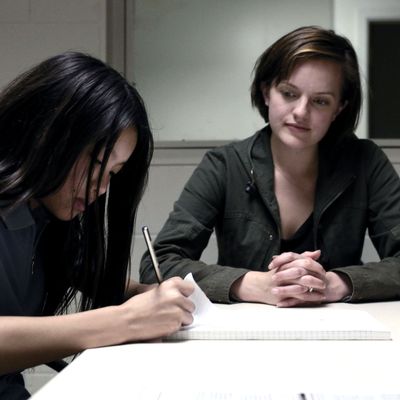
Sunday’s Sundance screening of Jane Campion’s Top of the Lake came with the following warning: “This seven-hour program includes one intermission and one short lunch break.”* For the first time in its history, the Sundance Film Festival was screening a miniseries (to air on the Sundance Channel in March) as a cinematic event. In his introduction, Festival co-director John Cooper said he’d been inspired by his own tendency to binge-watch TV shows as soon as the festival was over. He thought there just might be enough obsessives in Park City to fill up The Egyptian Theater — the town’s classic picture house — and watch the hell out of some good TV like it was their literal 9 to 5 job.
Helpful volunteers handed out one drink ticket and one lunch ticket to each audience member. There was an audible drop of morale (at least mine) when the theater manager announced the drink ticket was only good for non-alcoholic drinks. Yes, it was nine in the morning, but I could imagine a future in which this experiment could go horribly wrong and I wanted to be prepared. Campion took the stage and promised we’d have “I Made It Through Top of the Lake at Sundance” badges awaiting us on our final exit. She lied.
The opening shot zooms through a devastatingly gorgeous landscape on New Zealand’s South Island to a lake, clearly freezing cold. A beautiful twelve-year-old girl walks into the water up to her neck and just stands there until a local woman passing by breaks her trance and pulls her out. The girl is five months pregnant, and refuses to tell anyone who the father is. Enter detective Robin Griffin (Mad Men’s Elisabeth Moss, with an impeccable Kiwi accent), who’s come back to her small hometown of Laketop to visit her dying mother. She’s tasked with questioning the pregnant pre-teen Tui who, after again refusing to divulge the name of her child’s father, is sent back to her own dad — local drug lord Matt Micham (Peter Mullan), a prime suspect. The next day, Tui steals a horse and rides it to an area on her father’s land where a group of damaged, middle-aged women have set up a camp called Paradise. They live in shipping crates and follow the lead of an androgynous oracle figure/truth-teller played by Holly Hunter, who’s reuniting with Campion for the first time since winning an Oscar for The Piano. The Paradise Ladies give the girl refuge for the night. In the morning, she’s gone, and the mystery truly begins.
That was just hour one. By then, my fears of this being a masochistic attempt had been allayed. The mood of the series is so taut and eerie, I couldn’t tell if the story would stay grounded in reality or shift into bizarre Twin Peaks territory. (At one point, I was convinced we’d find out that the lake itself had impregnated Tui.) But it also has a uniquely Down Under humor throughout (Campion is herself from New Zealand) that keeps it from easy comparisons to Lost or other great TV mysteries. (Favorite line, from one Paradise woman to another: “You ever try masturbating? It’s very relaxing and not fattening.”) Hunter is often the hilariously frank comic relief, as well as the story’s moral center; one can only hope she’ll take on more juicy character parts like this (and generally appear onscreen more) going forward. As for Moss, this is the performance that could set a very promising tone for her post-Mad Men career. She’s stripped bare, both emotionally raw and literally. The actress initially balked at being naked, she told me after the screening, “You don’t want to be put in any position — pun intended — that’s not good.” But then she figured that “Jane Campion is the most feminist woman on earth; she’s going to be the last person to take advantage of you. She just made me feel safe. Most importantly, too, she was like, ‘You’re gonna look great!’”
During the first ten-minute intermission, Holly Hunter waited along with the rest of us in the bathroom line. Later she and Campion grabbed Sundance-provided bag lunches and ate them in their theater seats just as we did. Both sat through all six hours. As Campion observed to me later: “People were not leaving, except to maybe go to the toilet. I mean, I did once. And it seemed like there were more people there at the end than there were at the beginning! I don’t quite know how that happened.”
Much of the cast and crew had flown in from all around the world, not just New Zealand, but also the U.K. In the Q&A, we learned that newcomer Jacqueline Joe, who plays Tui, had been discovered at an Auckland swimming pool; that Moss had to fight for the part because it was hard for anyone to see her as a strong, tough detective after playing Peggy for so long; and that Hunter’s first reaction to being offered the part of GJ was, “Jane, why don’t you get Ben Kingsley to play this?” Pretty much every person who stood up to ask a question spent at least a minute congratulating himself and the rest of the audience for having made it to the end. “I felt a lot of love for all the audience because we’d been through the winter together,” Campion told me. We’re all still waiting for our badges of honor, though.
* This piece initially indicated the the film screened on Monday.

